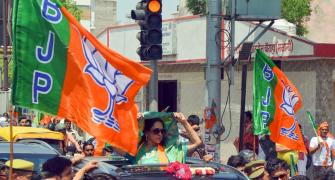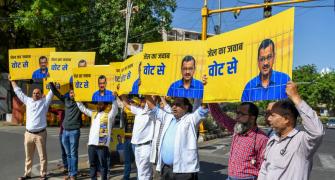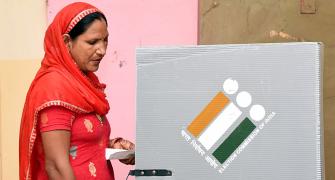Take a look at the state of India's three largest parties today. The Congress prime minister is in hospital, the first time in our history that we celebrated Republic Day without seeing or hearing from the prime minister.
Kalyan Singh, the erstwhile chief minister of Uttar Pradesh, has walked out of the BJP, to join rival-turned-friend-turned-rival-turned-friend Mulayam Singh Yadav. And in Kerala, one of the bastions of the CPI-M, the Marxists are getting ready to fight for the political career of the local party boss, Pinarayi Vijayan.
We all know that the dates of the 15th general election will be announced in about six weeks. But it is open to question if the three largest political entities are in any kind of shape to fight the polls. And what happens even if they do win? Does it mean any hope of better governance, or shall it be just business as usual? And just what does 'business as usual' mean in India?
The answer to that is the SNC-Lavalin scandal, which offers a snapshot of how things work -- or don't work -- in our country.
Readers outside Kerala have probably never even heard of SNC-Lavalin. And even readers in Kerala are probably most familiar with the name because Pinarayi Vijayan, the boss of the CPI-M's Kerala unit, may be involved -- or so the Central Bureau of Investigation reportedly claims.
Very briefly, for the benefit of those who are unfamiliar with the case, the Canadian firm SNC-Lavalin was awarded a contract for the renovation and modernisation of the Pallivassal, Chengulam, and Panniyar hydroelectric projects. Pinarayi Vijayan was the power minister in the E K Nayanar ministry from 1996 to 1998, and he is now apparently accused of offering undue favours to the Canadian firm. The CBI is now seeking sanction to prosecute him.
The CPI-M says the case has been cooked up by a pliant CBI to please its Congress masters in Delhi. The Congress retorts that it cannot be blamed if Pinarayi Vijayan is finally facing the music for his misdeeds. You can be sure that both sides will give the case plenty of air with the polls coming up.
Here is a suggestion: Forget about Pinarayi Vijayan's involvement and whether or not the CPI-M should sack him from his party post. Instead, take a good, hard, long look at what it says about doing business in India.
First, we never seem to get what we pay for. The total installed capacity of the Pallivassal, Chengulam, and Panniyar plants put together is 115 MW. Rs 374 crore was paid in order to increase generation of electricity. Today, after all the 'work', I am told not that a single additional MW has been added to the original figure. What has the Indian taxpayer received in exchange for his Rs 374 crore?
The issue, to my eyes, is not whether Pinarayi Vijayan was at fault or whether, as the CPI-M now alleges, the contract was signed by the concerned minister in the Congress-led A K Antony ministry, G Karthikeyan. The simple fact is that a lot of money was paid out with little or nothing to show for it.
Second, why do so many government deals always seem to carry peculiar riders attached to them? A team that included both Pinarayi Vijayan and the then Chief Minister Nayanar went to Canada in October 1996 to renegotiate with SNC-Lavalin. One of the items in the new deal was 'raising the complementary grant component of the package from Rs 43 crore to Rs 98 crore. The last component -- the grant from the Canadian aid agencies - was to be arranged by SNC Lavalin for setting up of a modern cancer hospital in Malabar.' (So says the CPI-M weekly newspaper People's Democracy.)
The construction of a cancer hospital is a good thing in itself but why on earth should it be linked to upgrading power plants? Was this a government project, or was it supposed to be an act of private charity? If the government of Kerala so desired it could have built such a cancer hospital on its own, without dragging a Canadian firm into the picture. Was any land acquired and transferred in the process?
In the event, it seems that this clause was not legally enforceable. In the welter of charges and counter-charges between the CPI-M and the Congress, only one clear fact stands out -- which is that no such hospital exists today even 12 years after the deal was struck.
Third, why is it that some third party always pops up when a government is negotiating? In the SNC-Lavalin case, we get to hear of a firm called 'Technicalia Consultants'. Based in Chennai, this was the firm that was given the contract to actually build the hospital. (Apparently, neither the government of Kerala nor SNC-Lavalin possessed the necessary expertise!) And as a result it was through Technicalia Consultants that any Canadian grants of money were to be routed.
Fourth, and last, why do cases in India drag on and on? And why do they never seem to gather speed except when one party or the other stands to gain electorally?
Why was SNC-Lavalin paid such high fees to do seemingly little? Why was an extraneous issue like a cancer hospital dragged into the modernisation of power plants? And why was Technicalia Consultants, or any other third party, brought into the picture at all?
The saddest part of the whole SNC-Lavalin saga is that, with minor modifications to the details, you could probably come up with a similar scandal in several other states. The names change, parties flit in and out of power, cases are filed and forgotten -- it is just business as usual in India.
To quote from the same poem by Yeats, when we look at our politics, we can only conclude that 'The best lack all conviction, while the worst are full of passionate intensity.'








